Claude Forthomme's Blog, page 21
June 23, 2015
Blogging for a Cause
 The child and the factory (pollution)- painting by Claude This follows on my blog post last week highlighting the gap that exists between the United Nations and the political world as it really is - the gap between ideals humanity strives for and the stark reality it has to live in, battered by war, pollution, inequality, and I gave the example of the President of Sudan's shameful escape from justice (he was indicted for genocide by the International Criminal Court, see here).
The child and the factory (pollution)- painting by Claude This follows on my blog post last week highlighting the gap that exists between the United Nations and the political world as it really is - the gap between ideals humanity strives for and the stark reality it has to live in, battered by war, pollution, inequality, and I gave the example of the President of Sudan's shameful escape from justice (he was indicted for genocide by the International Criminal Court, see here). Dear reader, that insufferable gap is what is pushing me to write about the United Nations.
Of course, I realize that a modest blog and my writing can't change the world. And I don't expect to be able to move many of you (if anyone) to start doing something (anything!) to improve mankind's lot. But if I can bring a little support to the many who work hard every day for a better world, that would be enough for me. That would make me happy.
That's why I've decided to consecrate my blog to the United Nations - fiction and non-fiction.
Now I'm working on two fronts:
non-fiction: a book about the United Nations tentatively called "Soft Power" subtitle: How Politics Play Out at the United Nations - Status: the proposal is written, I am working on the synopsis of the chapters and still gathering data; as to the sub-title, I'm still working on it, and it could change, and change many times, as the book approaches its final stage (not there yet!);fiction: a new novel in an unusual setting, one of the United Nations specialized agencies; it is based on my 25 years of experience working for FAO (Food and Agriculture, one of the UN specialized agencies) but no, the novel doesn't take place in FAO but in a UN agency called UN-EHRD (Education and Human Resources Development Organization of the United Nations). Sounds good? Are you wondering where it is? It's headquartered in Paris, but no, it doesn't exist! The location and the name are both fictional! Status : The first draft is written - a lot of it was done while I was still working for the UN - and I am currently into the (harrowing) work of finalizing it, editing, double-checking on my sources and updating where needed.
 Tomb of Omar Khayyam by Jay HambidgeIn a way, this novel is a fiction pendant to the non-fiction book - so much of my reflections in the non-fiction book are echoed by the characters who people the novel. It is tentatively called This Day's Madness, a title derived from a couple of lines of the 12th century Persian poet and mathematician Omar Khayyam that seems to describe the political situation the world lives in today:
Tomb of Omar Khayyam by Jay HambidgeIn a way, this novel is a fiction pendant to the non-fiction book - so much of my reflections in the non-fiction book are echoed by the characters who people the novel. It is tentatively called This Day's Madness, a title derived from a couple of lines of the 12th century Persian poet and mathematician Omar Khayyam that seems to describe the political situation the world lives in today:Yesterday this day's madness did prepare;
To-morrow's silence, triumph, or despairMy plan for this blog is to take you on trips with me as I write This Day's Madness and share with you what I discover in my research as I go along.
And I plan to do the same with the non-fiction book, whenever some news about the United Nations comes up or when I come across something particularly interesting in my research - thought I've already started doing this many times with articles I have written for Impakter that were published in their special section on the United Nations; it's nestled under their philanthropy section, see here, and for a list of my contributions, click here (a partial list! I still have to bring it up to date).
Last week was really full of news related to the work of the United Nations: there was the Pope's ground-breaking encyclical about climate change - a fantastic boost for the upcoming United Nations Conference in Paris, COP21 - and the World Refugee Day that enabled UNHCR to draw attention to the plight of refugees, 60 million today, the highest number yet in History, a dismal record indeed.
 Pope Francis with UN Secretary General Ban Ki-moon
Pope Francis with UN Secretary General Ban Ki-moonWhere did I get this idea for blogging? From Nina Amir, a writer who has developed the technique of “blogging a book” - I read about her on Elizabeth Spann Craig's blog. Nina Amir is the bestselling author of How to Blog a Book and The Author Training Manual and reportedly some of her clients have sold 300,000+ copies of their books, landed deals with major publishing houses and created thriving businesses around their books. I wrote a blog post about her (here) and reviewed her book on Amazon (here).
My next blog post is coming up soon and it will deal with my novel...and take you to Peru!
Any comments about the new turn this blog is taking? Do you like the idea? Have your ever tried to blog a book? Please share, I'd love to hear your experience!
Related articles [image error] UNHCR launches its 2015 World Refugee Day Campaign [image error] Refugee crises reflect world in chaos - UN [image error] Outrage: Venezuela wins UN award for combating hunger as its people scrounge for food [image error] Creating Bioprivacy as UN Conference to Publish Nagoya Protocol Handbook [image error] Why so many African leaders hate the International Criminal Court









Published on June 23, 2015 09:39
June 22, 2015
Blogging Two Books about the United Nations
 The child and the factory (pollution)- painting by Claude This follows on my blog post last week highlighting the gap that exists between the United Nations and the political world as it really is - the gap between ideals humanity strives for and the stark reality it has to live in, battered by war, pollution, inequality, and I gave the example of the President of Sudan's shameful escape from justice (he was indicted for genocide by the International Criminal Court, see here).
The child and the factory (pollution)- painting by Claude This follows on my blog post last week highlighting the gap that exists between the United Nations and the political world as it really is - the gap between ideals humanity strives for and the stark reality it has to live in, battered by war, pollution, inequality, and I gave the example of the President of Sudan's shameful escape from justice (he was indicted for genocide by the International Criminal Court, see here). Dear reader, that insufferable gap is what is pushing me to write about the United Nations.
Of course, I realize that a modest blog and my writing can't change the world. And I don't expect to be able to move many of you (if anyone) to start doing something (anything!) to improve mankind's lot. But if I can bring a little support to the many who work hard every day for a better world, that would be enough for me. That would make me happy.
That's why I've decided to consecrate my blog to the United Nations - fiction and non-fiction.
Now I'm working on two fronts:
non-fiction: a book about the United Nations tentatively called "Soft Power" subtitle: How Politics Play Out at the United Nations - Status: the proposal is written, I am working on the synopsis of the chapters and still gathering data; as to the sub-title, I'm still working on it, and it could change, and change many times, as the book approaches its final stage (not there yet!);fiction: a new novel in an unusual setting, one of the United Nations specialized agencies; it is based on my 25 years of experience working for FAO (Food and Agriculture, one of the UN specialized agencies) but no, the novel doesn't take place in FAO but in a UN agency called UN-EHRD (Education and Human Resources Development Organization of the United Nations). Sounds good? Are you wondering where it is? It's headquartered in Paris, but no, it doesn't exist! The location and the name are both fictional! Status : The first draft is written - a lot of it was done while I was still working for the UN - and I am currently into the (harrowing) work of finalizing it, editing, double-checking on my sources and updating where needed.
 Tomb of Omar Khayyam by Jay HambidgeIn a way, this novel is a fiction pendant to the non-fiction book - so much of my reflections in the non-fiction book are echoed by the characters who people the novel. It is tentatively called This Day's Madness, a title derived from a couple of lines of the 12th century Persian poet and mathematician Omar Khayyam that seems to describe the political situation the world lives in today:
Tomb of Omar Khayyam by Jay HambidgeIn a way, this novel is a fiction pendant to the non-fiction book - so much of my reflections in the non-fiction book are echoed by the characters who people the novel. It is tentatively called This Day's Madness, a title derived from a couple of lines of the 12th century Persian poet and mathematician Omar Khayyam that seems to describe the political situation the world lives in today:Yesterday this day's madness did prepare;
To-morrow's silence, triumph, or despairMy plan for this blog is to take you on trips with me as I write This Day's Madness and share with you what I discover in my research as I go along.
And I plan to do the same with the non-fiction book, whenever some news about the United Nations comes up or when I come across something particularly interesting in my research - thought I've already started doing this many times with articles I have written for Impakter that were published in their special section on the United Nations; it's nestled under their philanthropy section, see here, and for a list of my contributions, click here (a partial list! I still have to bring it up to date).
Last week was really full of news related to the work of the United Nations: there was the Pope's ground-breaking encyclical about climate change - a fantastic boost for the upcoming United Nations Conference in Paris, COP21 - and the World Refugee Day that enabled UNHCR to draw attention to the plight of refugees, 60 million today, the highest number yet in History, a dismal record indeed.
 Pope Francis with UN Secretary General Ban Ki-moon
Pope Francis with UN Secretary General Ban Ki-moonWhere did I get this idea for blogging? From Nina Amir, a writer who has developed the technique of “blogging a book” - I read about her on Elizabeth Spann Craig's blog. Nina Amir is the bestselling author of How to Blog a Book and The Author Training Manual and reportedly some of her clients have sold 300,000+ copies of their books, landed deals with major publishing houses and created thriving businesses around their books. I wrote a blog post about her (here) and reviewed her book on Amazon (here).
My next blog post is coming up soon and it will deal with my novel...and take you to Peru!
Any comments about the new turn this blog is taking? Do you like the idea? Have your ever tried to blog a book? Please share, I'd love to hear your experience!
Related articles [image error] UNHCR launches its 2015 World Refugee Day Campaign [image error] Refugee crises reflect world in chaos - UN [image error] Outrage: Venezuela wins UN award for combating hunger as its people scrounge for food [image error] Creating Bioprivacy as UN Conference to Publish Nagoya Protocol Handbook [image error] Why so many African leaders hate the International Criminal Court









Published on June 22, 2015 01:11
June 20, 2015
Grexit: Europe's Darkest Hour

Every day, Europe is moving closer to the brink. And the rest of the world - America and China included - will feel the tsunami when the Euro sinks.
The winds of recession are blowing, and their source is Europe and the incompetence of its political leaders.
Grexit, the possibility that Greece would move out of the Eurozone, was always there of course. It is at the heart of the Euro crisis, but it was only just that: a possibility. Now it is fast becoming a certainty.
The Greeks themselves have given up in spite of their long-held conviction that Greece should remain in the Euro - a conviction they have bravely demonstrated by their willingness to endure huge sacrifices to stay in, losing 25% of their GDP over the past five years, an enormous amount, not to mention galloping unemployment.
Since Monday, in just one week, Greek citizens have withdrawn €4 billion from their own banks.
A massive run on banks, the classic scenario before economic collapse.
If the Greek banking system hasn't collapsed yet as I write, it's because the European Central Bank is keeping it on life support, providing it with just enough €€€ (the rumor is that it's €1.8 billion) so that banks won't close their doors.
How did we ever get to this dire end? How could a whole continent - Europe, over 500 million people - whose values are based on human rights, human dignity, justice and equality and who are proud of those values, who have built the world's most advanced economic community, the European Union, come to this?
What happened?
Ask Germany. In particular Ms. Merkel who lives by schoolmarm slogans and her advisers, Mr. Schäuble, her Finance Minister, totally clueless about economics, and Mr. Weidmann, the President of the Bundesbank, in the grip of a demonstrably wrong monetary ideology (that requires, inter alia, a State to balance its budget on a yearly basis when government spending programs necessarily last many years - small wonder Germany has an infrastructure problem, it hasn't invested in it for decades).
These are the people who want to impose their views on Europe.
When the Eurogroup meeting ended in a debacle this week, all Ms. Merkel could think of saying was that the deal with Greece was "still possible" only if Tsipras, the Greek Prime Minister, would "move". She hammered it in: “Greece has received unprecedented solidarity over the last five years. The basic principle still applies: help in return for reforms.”
Help in return for reforms? Is that what she calls solidarity?
It is clear that politically Greece cannot implement any more reforms, especially NOT to its pension system. Politically impossible: the vote that brought Tsipras to power was a vote against austerity. Mr. Tsipras is bound to respond to his electors, that's the way democracy works.
But, to make matters worse, there is an insidious notion creeping around Germany (and Northern Europe), the idea that the Eurozone cannot become a "transfer union". The famous German Spiegel Magazine aired the notion four years ago, in 2011 (see here), claiming "There are a number of options for the institutionalized shift of resources from richer to poorer member states -- and Germany would end up as the biggest net contributor in every scenario."
Why anyone should be surprised that this is the case astounds me: Germany is, or is it not, the wealthiest, strongest economy in Europe? It has, or has it not, benefited the most from the creation of the Euro?
It is therefore normal and natural that it should pay and should pay more than the others. And as Sebastian Mallaby commented in the Financial Times that same year, Germany would be the "real winner in a transfer union". Germany will realize this is the case only, as he put it, when Germans finally "discard the myth, widely cherished in northern Europe, that peripheral southern countries are the undeserving beneficiaries of a charitable transfer union".
Unfortunately, since 2011, that myth has grown stronger. And more dangerous.
Bottom line, any monetary union of any kind is necessarily a "transfer union" . It's a nice technical term that simply means that when one of the member states is in trouble and running a budget deficit, the others help out so that the currency is defended.
That's the financial aspect, and that's the way the American dollar is run. There are many American states in trouble but none is threatened the way Greece is because the American dollar is defended by the Federal Reserve underpinned by the US Treasury. For example, in 2010, the news came out (here) that 32 American states were declared officially bankrupt, with California, Michigan and New York heading the list, and that the US Treasury has been conducting a shadow bailout worth $37.8 billion.
On a moral level, "transfer" is at the heart of cooperation, it is the act of helping out: the strong gives a hand to the weak, the rich to the poor.
But cooperation and solidarity no longer seem to be in the European DNA. Ask the right-wing populist party that have overrun elections everywhere, from Ms Le Pen's Front National (partly financed with Russian money - some €40 million cash - and small wonder) to the Italian Lega Nord. They all want out of the European Union, they all want to retreat to a pre-World War II situation.
Yes, nostalgia for the past is rising, we are going back to square one, as if World War I and World War II never happened. Erase the European Union! Bring down the United Nations! Let's go back to our nationalistic passions! Let's kick out immigrants and close our doors! Let's live among ourselves in absolute autarchy and economic self-sufficiency! Damn the rest of the world!
Germany nearly destroyed Europe in World War I, it tried again in World War II, and this time it might make it. With the enthusiastic consent of its northern European neighbors and all right-wing nationalistic parties across Europe.
Grexit would indeed mark Europe's darkest hour.
Is that the Europe we want? I don't recognize it. Do you?









Published on June 20, 2015 01:43
June 18, 2015
The Gap Between the UN and Political Reality
 The End of World War II: Americans celebrating victory over Japan
The End of World War II: Americans celebrating victory over JapanA world without war.
That was the dream of the United Nations' founding fathers. They had lived through World War II and they didn't want a repeat of the atrocities and destruction they had witnessed. They wanted permanent peace for future generations.
It never happened.
Seventy years have now passed since the creation of the United Nations, and war goes on, conflicts simmering here and there and exploding now and then. And the authors of those conflicts go unpunished, in spite of the UN efforts.
Why?
Because there is an apparently unbridgeable gap between the United Nations' lofty goals of peace and justice and political reality on the ground.
A gap that has never been larger as demonstrated by the most recent episode in the Omar Hassan al-Bashir saga, the President of Sudan who is on the run from the International Criminal Court since he was indicted on charges of war crimes, crimes against humanity and genocide in 2006, at the express request of the UN Security Council.
Everything began with the Darfur tragedy, for which Mr. Bashir is held responsible - a tragedy that recalls the Rwandan genocide and began to draw the world's attention in 2002 as several hundred thousand deaths were reported, and the victimized South Sudanese population was massively displaced, with millions forced into refugee camps or across the border.
 Darfur - IDP camp (Photo: Mohamed Moukhyer)
Darfur - IDP camp (Photo: Mohamed Moukhyer)For nearly ten years now, Mr. Bashir has been escaping the long arm of international justice - it is proving to be a very short arm indeed.
What happened on Monday June 15, 2015 hardly made a ripple in the media that merely reported the facts (see Reuters). It appears that only the New York Times made a serious effort at analysis (see Somini Sengupta's article here).
Here are the facts: Mr. Bashir fled the African Union summit meeting he was attending in South Africa, aboard a military plane, just ahead of an arrest order. What is shocking is that this ignominious flight happened with the complicit help from the South African government that deliberately ignored the order of its own High Court to prevent Mr. Bashir's departure.
And to think that South Africa was one of the founding countries of the International Criminal Court, one of the first to ratify the Rome Statute when it became operational in 2002. What has happened? Why this change of heart?
It would seem that South Africa - along with the African Union, essentially a "brotherhood" of African leaders intent on defending each other's impunity - has turned against the ICC, accusing it of unfairly singling out African leaders for prosecution.
How much truth in this accusation? Is the ICC really biased against Africa?
Hardly. To begin with, the ICC staff includes Africans, and they occupy top positions. The ICC Chief Prosecutor is a remarkable woman judge from The Gambia, Ms. Fatou Bensouda, sworn in in 2012, but she had served as ICC Deputy Prosecutor since 2004. Before joining the ICC, she had worked for the International Criminal Tribunal for Rwanda - she is well versed in the intricacies of genocide prosecution.
 ICC Chief Prosecutor, Fatou Bensouda (Wikipedia photo)
ICC Chief Prosecutor, Fatou Bensouda (Wikipedia photo)How true is it that the ICC has unfairly focused on Africa?
Leaving aside the democracy deficit of the African continent (and therefore a high likelihood that its leaders might come under prosecution), it is a fact that "nine situations", all of them in Africa, have come under official investigation by the ICC and 36 people have been publicly indicted. Proceeding against a third of them have been completed, two were condemned, one acquitted, and the rest variously dismissed (three died).
But the ICC's work is not exclusively focused on Africa, as the following map shows:
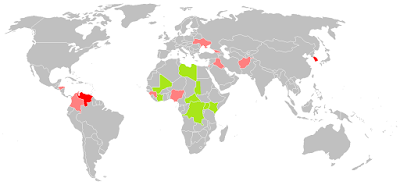 Green: official examinations; light red: on-going preliminary investigations; dark red: closed preliminary investigations (as of September 2014, source: "ICC investigations" by ICCmemberstatesworldmap102007.png: User:Glentamara, User:Athenchen, User:Curtis Newton, User:Sneecs, User:Nightstallion, User:Sesmith, User:Snocratesderivative work: AndrewRT (talk) - ICCmemberstatesworldmap102007.png. Licensed under CC BY-SA 3.0 via Wikimedia Commons - https://commons.wikimedia.org/wiki/Fi... ICC is presently engaged in "preliminary examination" of "situations" in Afghanistan, Colombia, Georgia, Guinea, Honduras, Iraq, Nigeria, Ukraine and aboard three vessels involved in the Gaza flotilla raid. That's two African countries out of nine (Guinea and Nigeria) and charges against the President of Kenya, Uhuru Muigai Kenyatta for his alleged role in the ethnic violence that followed the 2007 election (it led to 1,200 deaths) were withdrawn on 13 March 2015.
Green: official examinations; light red: on-going preliminary investigations; dark red: closed preliminary investigations (as of September 2014, source: "ICC investigations" by ICCmemberstatesworldmap102007.png: User:Glentamara, User:Athenchen, User:Curtis Newton, User:Sneecs, User:Nightstallion, User:Sesmith, User:Snocratesderivative work: AndrewRT (talk) - ICCmemberstatesworldmap102007.png. Licensed under CC BY-SA 3.0 via Wikimedia Commons - https://commons.wikimedia.org/wiki/Fi... ICC is presently engaged in "preliminary examination" of "situations" in Afghanistan, Colombia, Georgia, Guinea, Honduras, Iraq, Nigeria, Ukraine and aboard three vessels involved in the Gaza flotilla raid. That's two African countries out of nine (Guinea and Nigeria) and charges against the President of Kenya, Uhuru Muigai Kenyatta for his alleged role in the ethnic violence that followed the 2007 election (it led to 1,200 deaths) were withdrawn on 13 March 2015.  Uhuru Kenyatta, President of Kenya (AFP photo)
Uhuru Kenyatta, President of Kenya (AFP photo)The problem in a nutshell: the International Criminal Court, designed to prosecute heads of state responsible for genocide and crimes against humanity, has no power to arrest anyone and is totally dependent on the goodwill of the "international community", i.e. the Big Powers. In particular, the Big Five in the UN Security Council - since that is the only UN body that can call on military assistance.
The ICC has no one else to turn to. And the Big Five are divided: on one side, the UK and France who support the ICC; on the other side, the US, Russia and China who don't.
Yes, you read that right: on this particular issue of international justice - trial of heads of state responsible for genocide and crimes against humanity - , Americans have sided with the Chinese and the Russians. Mr. Putin must be very happy - no doubt another reason why he feels free to do as he likes with Crimea and the Ukraine.
Although it had indicated at first that it would sign on, the US never ratified the Rome Statute, the foundation act of the ICC - with the arrival of Republicans in power, there was a change of heart.
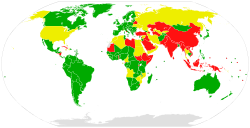 ICC: Green, signatory states; yellow, non-ratified; red, non participating
ICC: Green, signatory states; yellow, non-ratified; red, non participatingWith America withdrawing from the ICC, the dream of ever achieving a just world was shattered. The ICC was intended to break the vicious barrier of impunity that defends political leaders since the dawn of History: Criminal heads of state have always gotten away - literally - with murder. If you're an average citizen and kill someone, you face your country's justice. If you're a head of state and kill people by the thousands or millions, you don't.
Mr. Bashir is as bad as Hitler or Stalin or any of the other criminal autocrats you can think of. And he knows he can escape, that he will always escape as long as the UN has no teeth. As long as the Big Powers who can stop him won't do it.
Worse, the Big Powers welcome him. In 2011, Mr. Bashir made a successful trip to China where he was received "like a brother". He may not dare to visit the US (not yet), but South Africa gave him a warm welcome. According to the Sudan Tribune (as reported in an article by Global Research, an outfit that believes the ICC is a small, insignificant court, a product of Western Imperialism) the Sudanese foreign minister received assurances from his South African colleague that South African authorities were "proud of the participation of President al-Bashir and that they are responsible for protecting him”.
At the African summit, Mr. Bashir was among friends.
Small wonder that when Mr. Bashir returned to Sudan he was given a hero's welcome by his supporters.
 Supporters welcome Bashir upon his return from S.Africa (Reuters)
Supporters welcome Bashir upon his return from S.Africa (Reuters)This is why I am moved to write a book about the United Nations. Seventy years after its foundation, the dream has turned sour, we are as far away as ever from a just, peaceful world. People cling to their nationalistic passions and continue to embrace dictatorial leaders that can only promise a repeat of the horrors of the past.
The United Nations was meant to provide mankind with a future and every day it looks like that future is receding further. Let me quickly add that I don't think any book I may write will make much of a difference to the future of either mankind or the United Nations.
But I believe that it could help to shed some light - even a little light! - on what is really going on, what the stakes are. And I am not quite as desperate as I sound. I do believe that in the long-run Man's goodwill and better instincts will prevail over senseless violence and destruction. Ultimately, Man is a builder, not a destroyer. And that is what the UN is about, building a better, more just world, where people don't kill each other and don't go hungry.
And you know what? The UN draws to itself people who believe in this, people for whom all those big words - human rights, human dignity and freedom - are not empty words. Those are the people who work within the UN system - oh yes, not everyone believes in those pretty words, but many do, I know, in the 25 years I worked for FAO, I met so many of them. And slowly but surely, those are the ones who make a difference.
Like the ICC, now under attack in Africa. It has to retreat but it has hidden powers it can count on to continue the good fight. First, it draws on highly competent and dedicated people who believe in the ICC mandate: consider the situation, here we have an African Chief Prosecutor, a skilled judge who's been at it in various tasks since 2004 and hasn't stopped working because the "situations" under investigation happened to be located in Africa.
Second, it can count on a body of international law to sustain its cases. And if it is lacking in physical clout - a police to arrest people, a prison to detain them - it can call on the UN Security Council to force collaboration from UN member states: those states have signed onto the UN Charter and they must comply, even and including those who haven't ratified the ICC founding treaty or have opted out.
Again, what you have here is the power of international law.
And there's always hope that the United States will "wake up" and realize how uncomfortable it is to find China and Russia as your bedfellows on all matters pertaining to the ICC. The day the US ratifies the Rome Statute will be the day the ICC will no longer be considered a "small, insignificant court" by African states.
All these fledgling attempts to make the world better amount to what I call the United Nations' "soft power" - because the UN is acting softly, often silently, but it is there nonetheless, even when the Big Powers ignore it or try to block it. In that sense it deserves the term "power".
 The UN's soft power is a small light in the night, like a candle that a strong wind can flicker out. But it can be nurtured and strengthened. Many people in civil society organizations are aware of this - from major charities like the Bill and Melinda Gates Foundation to international NGOs like Amnesty International or Human Rights Watch - and they see it as their task to strengthen it.
The UN's soft power is a small light in the night, like a candle that a strong wind can flicker out. But it can be nurtured and strengthened. Many people in civil society organizations are aware of this - from major charities like the Bill and Melinda Gates Foundation to international NGOs like Amnesty International or Human Rights Watch - and they see it as their task to strengthen it.Which brings us to the third party in the UN game or rather, the "first" party: national governments, those who signed on and feel that they are the prima donnas of the UN system. After all, the UN was created for them, to provide a forum for discussion as a way to avoid war. They too use "soft power", financing certain UN agencies and programmes over others, pushing their own candidates in top management jobs, shifting the agenda and promoting "consensus" on questions of interest to them, and, in the case of the Big Five, blocking resolutions at the Security Council - all in order to "control" the system.
So UN politics boil down to a game between three contending parties: the member states attached to their national identity, the UN staff attached to UN values and civil society as a watchdog (but also at times pushing its own agenda).
How that game is played is what my book is about.
The result? Soft power UN-style: Slowly things move forward - very slowly. It took nearly twenty years of efforts to get to the Climate Change conference in Paris at the end of this year - and with still no assurances of achieving any serious agreement. And the ICC? It's so new - only 12 years of activities, it's too soon to tell...
By now, you've no doubt guessed it: "Soft Power" is going to be the main title of my book. I'm still working on the sub-title... Suggestions welcomed! Actually, I welcome any comment, I'd love to know what you think, whether such a book would interest you. And as I write it, I plan to share with you my journey through the UN, its past, present and new challenges as they occur - like this one, about the ICC and Mr. Bashir.
And if you have any questions, please ask, don't hesitate.









Published on June 18, 2015 14:00
June 15, 2015
How to Create a Blog that Sells Books
 Logo of How to Blog a Book, Nina Amir's blogThat is the question haunting every writer worth her/his salt...
Logo of How to Blog a Book, Nina Amir's blogThat is the question haunting every writer worth her/his salt...Publishers and agents say you need a blog, that you must build up your "author platform" and that nothing will work as well as a blog - not your author website (because it's static, nothing happens on it), not your Twitter or Facebook pages or any of the other networks, like Pinterest, Instagram and messaging apps...Too much noise and who's ever bought a book on the basis of a Tweet or a picture? Ok, some may have, but not too many...
And now Facebook forces you to buy ads if you want to be noticed - your "likes" may rise, but what about clicks on that "buy" button?
So could it be that the good old blog may yet be the best place to build your author platform and link to readers?
I don't know about you, but I've blogged for years (since 2009) and never noticed a link between my blog and my book sales. A link to readers? Yes, definitely. I love to see my blog stats about the people who come and read my posts, I'm even happier when you guys comment...but book sales?
There seems to be a disconnect.
Best-selling author and coach, Nina Amir has the answer. She is the "blog-a-book" (or the reverse: book-a-blog) guru and her "how-to" guide has been a best seller on Amazon for years. Her revised and expanded version of "How to Blog a Book", out two weeks ago, has just hit #1 in the "new release" listing in the "writing and composition" category:
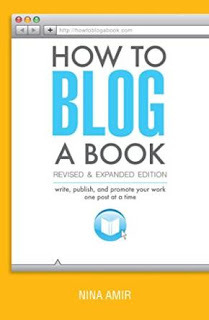 Available from Amazon here
Available from Amazon hereI spent the week-end reading it and mulling over the idea.
It's obviously a great way to market "test" your book idea: if people flock to your blogged book, it obviously means there's a market for it. And when your blog traffic grows exponentially, publishers and literary agents take note. Many bloggers have thus landed lucrative traditional publishing deals or gone on to self-published success.
But the idea of breaking up a manuscript in "bloggable" tid-bits (300 to 500 words posts recommended) and to publish posts every day (or a minimum of 3 times a week) for as many months as needed to finish the blogged book is simply...daunting! And once the book is out, you can't really stop publishing posts on your blog, you need to keep it alive with at least two posts per week.
Some people have the stamina to do this and Nina Amir herself clearly does (she runs 5 blogs!) And she still manages to smile and look totally relaxed...

It requires Teutonic, disciplined planning, the ability to write a detailed outline and plan every post as sub-points in the blogged book's chapters. Nina Amir claims you can write as you go along and that it even helps you to finish your manuscript - a problem for non-fiction writers who are often stuck with book proposals they haven't sold yet and as a result they don't get on with their writing. So blogging-a-book no doubt helps non-fiction writers, but it may not work so well for novelists - particularly the "pantsers" among you, i.e. those who simply cannot write to an outline and are carried along by their muse...A fickle lady who will sometimes embark you down the wrong road and then you need to cut everything out and start over (I know, it's happened to me, I find it difficult to work to an outline). But are you willing to share on Internet your "hiccups" with your (potential) readers? I'm not sure I'd have the guts to do it.
Then, there's a second type of problem should you decide to self-publish: you can use KDP, no problem, but not KDP Select: as you know, it has that exclusivity clause for 90 days and requires you to take everything down on all sites, not just Smashwords and Barnes and Noble, Kobo etc but also your own blog! You're only allowed to leave 10 percent of your book on your blog.
In fact, according to Nina, experience shows that those who landed a traditional publishing deal often wrote anywhere between 40 and 60 percent more, to provide readers with new material.
To sum up: my impression is that blogging a book (or doing the reverse, making a book out of blog posts) works well to attract readers but it is a strategy that requires a little caution. It's probably a good idea not to blog the whole book but only part of it in order to give readers something new to look forward to when they buy the book. And the strategy is easier to apply to non-fiction, especially to "how-to" books that are a compilation of tips, tricks, advice of any sort that can be "cut up" in self-standing bits and pieces. If you think your book lends itself to this strategy, get Nina Amir's book, it is really chock-full of excellent and detailed advice, I highly recommend it.
As for myself, I'm still mulling it over. I do have a non-fiction book in the works, about the United Nations, but I'm not sure I can cut it up in bits and pieces as short as 300 to 500 word posts - though, as anyone who's following this blog knows, I've already published a number of articles about the UN on Impakter, in that magazine's philanthropy section...And I have the first draft of a novel in a United Nations setting - but again, the way I write, scenes are rarely amenable to such short pieces, it takes me more than 500 words to build up to a cliffhanger...On the other hand, I could share my writer's journey with you, mixing some excerpts from my books with what I come across when I do research for both books. That might be a way to "blog a book" without actually reproducing it on the Net...
Your point of view? Have you ever blogged your book or thought about it?









Published on June 15, 2015 10:37
June 8, 2015
WILDFIRE: A True Story
The following story, just published on Impakter, is based on real events, as reported to me by one of my colleagues in the FAO Evaluation Service. The episode took place some twenty-five years ago, at a time when traveling in Africa was often an adventure with totally unexpected endings.
Like this one.

DIARY OF A UN OFFICIAL #4: WILDFIRE
Claude Forthomme
May 1990, on the road to Yalinga . A potholed dirt road , plunging straight forward, in the middle of nowhere, between Bangui and Yalinga, a small town lost in the south-east corner of Central Africa. Sheets of fire weave across the low, sunburned hills in long, narrow lines, fed by the yellowed savanna grass. The flames are broken now and then by broad, dried riverbeds and by the road itself. Tall termite mounds like gray sentinels on the wayside, rise above the fire, unscathed.

In the photo: The road between Bangui and Yalinda – Photo credit: DFID / Simon Davis
And on that road, like a lonely beetle scuttling through the flames, a beige Land Rover forges ahead, raising a cloud of dust. Two white and blue medallions stuck on the side doors announce that the Land Rover is United Nations property .
Inside, five people, two black, three white. One woman, four men. The driver is African, fat and sweating under his red wool knit cap pushed low on his forehead. Next to him, in the only comfortable passenger seat, the project manager is half-asleep, a contented half-smile hovering on his lips. He has a powdery white beard framing his face in a reverse halo, like Father Christmas. In the back of the car, jostled by the Land Rover’s unforgiving suspension, the rest of the mission members grimly hold onto their hard seats with both hands.

In the photo: A young man tending his livestock in Bangui, Central African Republic. – Photo credit: UN Photo/Evan Schneider
Of the two men sitting in the back, only the African looks cool, his white shirt is spotless, his trousers well pressed. He is an important local Government official. His black leather shoes are highly polished, like an elegant clergyman’s. The other man, much younger, is sloppily dressed in patched jeans and a wrinkled T-shirt sticking to his back. Occasionally he pulls out a dirty handkerchief to wipe beads of sweat running down his forehead and unshaven cheeks. He wears the heavy but sensible desert boots dear to all European experts working in Africa.
The woman, unlike her white companions, is as calm and composed as the dignified Government official.
To find out what happens next, read here.









Like this one.

DIARY OF A UN OFFICIAL #4: WILDFIRE
Claude Forthomme
May 1990, on the road to Yalinga . A potholed dirt road , plunging straight forward, in the middle of nowhere, between Bangui and Yalinga, a small town lost in the south-east corner of Central Africa. Sheets of fire weave across the low, sunburned hills in long, narrow lines, fed by the yellowed savanna grass. The flames are broken now and then by broad, dried riverbeds and by the road itself. Tall termite mounds like gray sentinels on the wayside, rise above the fire, unscathed.

In the photo: The road between Bangui and Yalinda – Photo credit: DFID / Simon Davis
And on that road, like a lonely beetle scuttling through the flames, a beige Land Rover forges ahead, raising a cloud of dust. Two white and blue medallions stuck on the side doors announce that the Land Rover is United Nations property .
Inside, five people, two black, three white. One woman, four men. The driver is African, fat and sweating under his red wool knit cap pushed low on his forehead. Next to him, in the only comfortable passenger seat, the project manager is half-asleep, a contented half-smile hovering on his lips. He has a powdery white beard framing his face in a reverse halo, like Father Christmas. In the back of the car, jostled by the Land Rover’s unforgiving suspension, the rest of the mission members grimly hold onto their hard seats with both hands.

In the photo: A young man tending his livestock in Bangui, Central African Republic. – Photo credit: UN Photo/Evan Schneider
Of the two men sitting in the back, only the African looks cool, his white shirt is spotless, his trousers well pressed. He is an important local Government official. His black leather shoes are highly polished, like an elegant clergyman’s. The other man, much younger, is sloppily dressed in patched jeans and a wrinkled T-shirt sticking to his back. Occasionally he pulls out a dirty handkerchief to wipe beads of sweat running down his forehead and unshaven cheeks. He wears the heavy but sensible desert boots dear to all European experts working in Africa.
The woman, unlike her white companions, is as calm and composed as the dignified Government official.
To find out what happens next, read here.









Published on June 08, 2015 08:06
June 1, 2015
Write On by Kindle: Amazon's Answer to Wattpad
Late last year, Amazon launched a new site called "Write On" where writers can upload their work, any length, from novels to short stories, and get feedback from readers and other writers.
According to Tech Crunch (see here), it was meant to compete with what they call "crowdwriting" sites like Wattpad . Or, for that matter, Readwave , though Tech Crunch didn't mention it. I love the terms techies will invent, like crowdwriting. Indeed, it would be nice if it drew large crowds, but (as I explain below) that doesn't seem to be happening to Write On, or at least not yet. Perhaps the site is too new: it was in beta from October 2014 and was only officially introduced and opened to everyone in March 2015 .
This is the landing page, last time I checked when writing this post (30 May):
 To go to Write On by Kindle, click here
To go to Write On by Kindle, click hereAs you can see, they are actively engaged with writers, calling for week-end stories (and more).
And naturally, they feature up front what is trending (for example, Far From Normal got a whopping 534 likes):
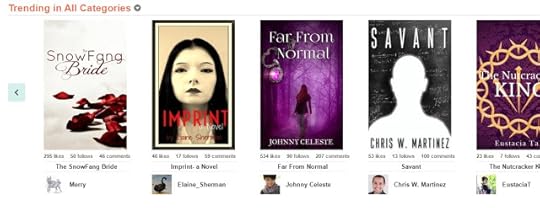
And, what is really nice, they also feature stories for those who are looking for feedback:

And naturally they give voice to the community of members, highlighting discussions on the landing page, like this one (an interesting topic) when I last visited:

I briefly surfed the discussion and found a great diversity of opinions. One member thought it was a useful way to introduce a secondary character that would become a major one later in the novel; another who admitted to not liking prologues said that they work for him only when "they show (rather than tell) a fairly concise scene that is relevant"; yet another felt that a prologue is a "warning sign that something was wrong and the author had to hurry up and fix it."
Curious to find out more opinions? Go join the discussion, click here.
Now, the BIG question: How effective is this site for writers who want to reach out to readers?
The short answer: perhaps not as well as a newbie might wish - unless you're "the pick of the staff", it's hard to stand out from the crowd (and don't ask me how to become the staff's pick, I have no idea).
The long answer: Write On is very new and perhaps too geared to attracting writers rather than readers. Of course writers are also readers but one would like to have readers that are not writers too! Compared to Readwave and Wattpad - at least when they were first launched - reads are relatively few. When I uploaded a short story on Write On, it only got...2 likes and 3 reads! Now that never happened to me on either Readwave or Wattpad: on both sites I always reached 100 reads in a matter of 24 hours and some of my stories got around 2,000 reads. So why did I do so poorly on Write On? One thing: I uploaded it 4 months ago when the site was still in beta. And my story perhaps is not very good, I don't claim to be Shakespeare! It's a 360 words short-short, called "In the Ditch", that I presented with the following pitch line: "Getting home after a long day's work, this is one thing you don't want to happen." Perhaps that's not sufficiently catchy? Anyhow, here is how it looks on the Write On site and I think they did a good job of presenting it:

This is the opening page of my short story:

Sorry, this is a screen shot, I can't include the whole story here on my blog simply because I (foolishly) didn't keep the original draft on my computer (and if I did, I lost it!) So, if you're curious to see how that story ends, you'll have to click here to read it on the Write On site.
Setting aside my own experience, how does Write On fare in general compared to its rivals, Wattpad and Readwave?
I've talked about both sites on this blog in the past (I joined both), and overtime, both sites have evolved. For example, non-fiction has become very popular on Readwave - perhaps people who surf the Net are looking for real stories rather than fiction?
Then, over the past year, something else happened. These sites - possibly because they are overrun with new stories - are no longer that friendly to new writers. Also, biggies have joined them, particularly Wattpad, attracting the readers' attention. Perhaps the biggest names there are Margaret Atwood and Paolo Coehlo who have both uploaded their latest creations on Wattpad. And when they do, they get thousands of readers.
Here's Margaret Atwood's - she's just launched a contest inviting the Wattpad community to "write the future" with her:
 Click here to see it on Wattpad
Click here to see it on WattpadAnd, unsurprisingly, she got 7,700 + viewers in just 6 days - hey, want to join in the contest? You're still in time! Paolo Coehlo's latest book, The Warrior of Light, A Manual, just published (available on Amazon of course, and yes, it's non-fiction!) was perhaps not quite so successful, but still doing very well, nearly 1,000 views in 2 days, here it is:
 To read it on Wattpad, click here
To read it on Wattpad, click hereCompared to such numbers, neither Write On or Readwave make the grade - though the latter, in its heyday was very effective, I remember getting several thousand reads back in 2014 when I uploaded the opening of my science fiction novel Gateway to Forever (of course science fiction is a popular genre, and it did much better than my other stories that weren't).
To get a sense of what success means on Write On, take a look at its biggest on-going success: Far From Normal by Johnny Celeste, see here. It got 565 likes, 755 reads and best of all: 217 comments!
To conclude: success on Write On may not be spelled in terms of thousands like Wattpad - at best, you reach 700 to 900 readers but you do get feedback. Not bad - and for affirmed writers with a following, it is no doubt useful to expand readership.
I'm curious to find out how others have used this site now that it's been open to everyone for two-three months.
Do you like it? Do you return to it? What did you get out of it, as a reader or as a writer?
Related articles for writers interested in short stories: [image error] Why not turn that novel into a short story? [image error] Short Story Sunday Celebrates 250 Members & Needs Your Story!









Published on June 01, 2015 03:10
May 28, 2015
The United Nations Needs a Reset!
I recently went to the World Food Programme headquarters here in Rome - there was an Executive Board meeting this week. And here is a report of the opening event marked by some arresting statements, just published on Impakter:

The United Nations: The Reset and Syria’s St. BernardClaude Forthomme on 26 May, 2015 at 11:05World Food Programme, Executive Board, 25 May 2015. This was a memorable day – the WFP Executive Director, Ms. Ertharin Cousin, made a highly remarked opening address, exclaiming: “the United Nations is 70 years old this year, it needs a reset!” And her guest of honour, Mr. Staffan de Mistura, the UN Special Envoy to Syria, described his job as “mission (nearly) impossible”.

In the photo: UN Special Envoy for Syria Briefs Press Staffan de Mistura, Special Envoy of the Secretary-General for Syria, speaks to journalists, following closed-door Security Council consultations on the crisis in Syria. 24 April 2015 United Nations, New York – Photo credit: UN Photo/Loey Felipe
First, Ms. Cousin’s speech. She listed for the Board (consisting of a number of delegates from member countries, designated on a rotating basis) the rising number of emergencies that WFP has to face. In 2014, there were eleven high-level emergencies (classified as L2 and L3 in the UN jargon), an all-time high. Indeed, the WFP is set in principle to handle three high-level emergencies at any one time – not eleven.
 In the photo:
SG Visits the Philippines, Assesses UN Relief Efforts Secretary-General Ban Ki-moon visited Tacloban City, in the Leyte Province of the Philippines, to assess the relief and rehabilitation efforts for the survivors of Super Typhoon Yolanda/Haiyan. A resident of Tacloban surveys the damage and debris left by the storm. – Photo credit: UN Photo/Evan Schneider
In the photo:
SG Visits the Philippines, Assesses UN Relief Efforts Secretary-General Ban Ki-moon visited Tacloban City, in the Leyte Province of the Philippines, to assess the relief and rehabilitation efforts for the survivors of Super Typhoon Yolanda/Haiyan. A resident of Tacloban surveys the damage and debris left by the storm. – Photo credit: UN Photo/Evan Schneider
Why is this happening?
The rest on Impakter, and in particular the extraordinary anecdote reported by the UN Special Envoy to Syria, read here.










The United Nations: The Reset and Syria’s St. BernardClaude Forthomme on 26 May, 2015 at 11:05World Food Programme, Executive Board, 25 May 2015. This was a memorable day – the WFP Executive Director, Ms. Ertharin Cousin, made a highly remarked opening address, exclaiming: “the United Nations is 70 years old this year, it needs a reset!” And her guest of honour, Mr. Staffan de Mistura, the UN Special Envoy to Syria, described his job as “mission (nearly) impossible”.

In the photo: UN Special Envoy for Syria Briefs Press Staffan de Mistura, Special Envoy of the Secretary-General for Syria, speaks to journalists, following closed-door Security Council consultations on the crisis in Syria. 24 April 2015 United Nations, New York – Photo credit: UN Photo/Loey Felipe
First, Ms. Cousin’s speech. She listed for the Board (consisting of a number of delegates from member countries, designated on a rotating basis) the rising number of emergencies that WFP has to face. In 2014, there were eleven high-level emergencies (classified as L2 and L3 in the UN jargon), an all-time high. Indeed, the WFP is set in principle to handle three high-level emergencies at any one time – not eleven.
 In the photo:
SG Visits the Philippines, Assesses UN Relief Efforts Secretary-General Ban Ki-moon visited Tacloban City, in the Leyte Province of the Philippines, to assess the relief and rehabilitation efforts for the survivors of Super Typhoon Yolanda/Haiyan. A resident of Tacloban surveys the damage and debris left by the storm. – Photo credit: UN Photo/Evan Schneider
In the photo:
SG Visits the Philippines, Assesses UN Relief Efforts Secretary-General Ban Ki-moon visited Tacloban City, in the Leyte Province of the Philippines, to assess the relief and rehabilitation efforts for the survivors of Super Typhoon Yolanda/Haiyan. A resident of Tacloban surveys the damage and debris left by the storm. – Photo credit: UN Photo/Evan SchneiderWhy is this happening?
The rest on Impakter, and in particular the extraordinary anecdote reported by the UN Special Envoy to Syria, read here.









Published on May 28, 2015 09:28
May 23, 2015
Europe vs. Greece: A Logjam that Threatens the Euro
 Source: Chappatte, Eurofree 3
Source: Chappatte, Eurofree 3Greece, whose economy has been destroyed over the past five years by vicious austerity policies is now precariously balanced on the brink of financial disaster as Eurozone financial ministers and the (infamous?) "troika" - the IMF, the European Central bank and the European Commission - mull over what to do.
The European Commission has reportedly tabled a proposal to break the logjam, offering the use of the Euro financing facility, the ESFS, created in 2010 as a "temporary crisis resolution mechanism". And recourse to the ESFS is offered in return for pension and labor market reforms in Greece.
Problem solved?
No, it appears that the other two members of the Troika have not approved the EC proposal and perhaps not even read it. So nothing happens. Eurozone finance ministers go from one meeting to the next, week after week, expressing increasing annoyance at the flamboyant Greek finance minister, Yanis Varoufakis - no doubt because he is telling them the truth.
And the truth is: Austerity Policies Do.Not.Work. Full stop. If you kill employment, no one can pay taxes, it's as simple as that. Greece sinks into an ever deeper hole dug by an ever increasing debt.
Economists know that some debts cannot be paid back, no matter how much belt-tightening you engage in. Precisely because that tightened belt makes you weaker by the day and prevents you from ever making enough money to pay back your debts.
In such cases, the solution is simple: forgive the debt. Strike it out. Start from scratch, give people in debt breathing space so they can climb out of the hole. The Eurozone can afford it, Greece's economy is small, some two percent of total Eurozone GNP.
But it seems that politicians do not know this - especially certain politicians like the German Chancellor. Ms. Merkel is a fine political animal, attuned to her electorate, but she has no knowledge and even less understanding of economics. Strangely enough, so do her main advisers, Mr. Jens Weidmann, President of the Bundesbank, and Mr. Wolfgang Schaeuble, her Finance Minister.
In the case of Mr. Schaeuble, his lack of knowledge is easy to explain; he studied law at the Universities of Freiburg and Hamburg, obtaining from the latter a doctorate in law in 1971 with a dissertation called "The public accountant's professional legal situation within accountancy firms". Surely a subject that couldn't be further away from public finances. His early career didn't enrich his knowledge of economics: he worked in a tax office in Freiburg and subsequently, from 1978 to 1984, he practiced law in the district court of Offenburg. The rest of his life was spent in purely political activities, reaching as high as the Christian Democratic Union (CDU) chairmanship in 1998, only to resign 15 months later in the wake of the illegal donation scandal that rocked the party.
Mr. Weidmann's obtuseness regarding economic matters is more surprising, since he did obtain a doctoral degree in economics from the University of Bonn in 1997 - but he got his training from a monetary theorist, Manfred J. M. Neumann, a relatively obscure economist who, at present, has left the university and is in the Bundesbank alongside his pupil, in the vest of Research Professor at the Bundesbank Research Centre.
It's a small world - and a small world of people who blindly follow the teachings of Milton Friedman and are true believers in the Washington Consensus - economic theories that have been so discredited that even the IMF has had to abandon them; and of course, the American Federal Reserve, under Ben Bernanke's leadership, has successfully helped steer the United States out of the 2008 Great Recession, pumping money into the economy - an unthinkable course of action for strict monetarists like Schaeuble, Wiedmann and Neumann who do not understand the counter-cyclical use of the public sector.
Yet that counter-cyclical role of government in the economy is really easy to understand: when demand in the private sector collapses (as it did in the 2008 recession), you spend money in the down cycle to preserve overall demand; and you (the government and central bank) tighten the belt in the up cycle. That's the moment you want to balance the budget and trim deficits. Not before. And certainly never during a down cycle.
But Schaeuble, Wiedmann and Neumann don't understand this.
In fact, the whole of Germany does not understand this: Germans have even worked it into their Constitution that government budgets should be kept in balance every year. And they want the rest of Europe to do the same!
The nonsense is palpable, but how do you explain that to the Germans who are still suffering from memories of the Weimar Republic's super inflation? That was back in the 1920s, ninety years have passed, the Great Depression came and went as Keynes taught the world how to deal with it - but the Germans keep their eyes closed and continue in the childish conviction that a State's budget is the same as a housewife's or a small business'; that it should be balanced at the end of every year, regardless of the length of the spending cycle for government programs, especially in infrastructure building that can last several years, even decades. Small wonder that Germany is now facing a serious problem of under-investment in essential infrastructure!
Back to Greece. The Germans (and the rest of Europe along with the IMF) bailed Greece out expecting the Greek economy to contract by 4 or 5 percent before rebounding - instead, it contracted by over 25% and never rebounded.
On the contrary.
There's a full blown humanitarian crisis on-going in Greece: Greek unemployment stood at 25.7% in March 2015 and Greeks under 26 suffer from an astounding 58.3% rate of unemployment (see Eurostat data here and here). That's three out of five young people without a job! And there have been reports (for example, the UK Guardian here) that some 500,000 children suffer hunger; that poor people with chronic diseases like diabetes or heart problems can no longer get the medication they need from the national health system and they can't afford to buy it on the open market because of the high cost; that museums are understaffed and archeological digs stopped for lack of funding; that schooling and higher education are both curtailed. Many rely on handouts and soup kitchen. The Church of Greece distributes daily 250,000 food rations.
In March this year, it was reported that the EU pledged €2 billion ($2.7 bn) to "ease" the crisis. Better than nothing but far too little to make a real difference. Consider the debts Greece has to keep paying: this coming June, €6.74 billion; in July, €5.95 bn ; in August, €4.38 bn etc. I stop, you get the idea.
 Source: BBC article
Source: BBC articleWhat are European leaders thinking of? Don't they see that the Euro is going to hit the wall any minute now? Don't they care that they have caused an unprecedented humanitarian crisis, something unseen in Europe since World War II except for the 1990s war in the Balkans?
Where is their moral fiber? Their sense of cooperation with European brothers and sisters who are suffering? What kind of Europe is this?
In fact, European leaders are ridiculous. And the ridicule couldn't be greater than at this week's meeting in Riga, bringing them together with the six countries that are part of the Eastern European Partnership (Armenia, Azerbaijan, Belarus, Georgia, the Republic of Moldova and Ukraine). This is a partnership that is anything but. Born five years ago, it was meant to open up Europe to those Eastern countries - much to Putin's dismay, as he promptly demonstrated with his invasion of Crimea and Eastern Ukraine. Not unsurprisingly, the Riga meeting has produced no progress, not even the extension of visa-free travel to more countries - of the six countries, the only one who got this perk a couple of years ago was Moldova; but Moldovans are so steeped into their Soviet dreams and eager to get back in the Russian fold that they are not interested in using it - see the NYT article.
Let me finish this post with a "cherry on the cake": Schaueble's latest advice to Greece. The news just came out today as I write (22 May): according to an RT article, he suggested in a talk in London introducing a "parallel currency" in case the negotiations fail, reportedly citing the example of Montenegro that uses the Euro without belonging to the Eurozone.

Greece like Montenegro?!
Is he serious? When Goldman Sachs analysts suggested three months ago that a "hybrid situation" could arise in Greece, whereby Greek citizens could use "loan certificates" (or IOU receipts) on the local market, similar to the currency arrangements in Cyprus, Montenegro and Kosovo, nobody gave much credit to the idea. Because it is a fundamentally flawed comparison: those three countries already have their own currency system working for them.
That would not be the case for Greece. It would have to abandon the Euro and build up a new currency system from scratch. A time-consuming, high-risk endeavor that would require a total overhaul of the banking system. For citizens, it would mean the loss of savings, for local businesses, the impossibility to get loans, for foreign investors, the freezing of their assets.
In short: an economic apocalypse.
Would the rest of Europe get hurt besides Greece? Yes, though perhaps not so much - at least at first. One thing is certain, a Greek default would mean a straight loss for all creditors, starting with the European Central Bank that has a €110bn exposure to Greek banks and has spent around €20bn on buying up Greek government bonds. It could of course print Euros to cover the loss, but Germany (with Weidmann on the ECB board) is not likely to allow that.
Would the Euro survive?
That is a good question. Because "dropping Greece" is something that signals to the world that the Euro is a currency that cannot be trusted. If Greece gets treated by Brussels in this cavalier way, the same could happen to Portugal or Spain or anyone in the Union. And it could even happen to a bigger Euro member: why not Italy whose debt is simply huge?
The damage in terms of international trade would be enormous. The Euro would sink, making imports (especially oil) extremely expensive for all Europeans, including Germans. Exports (because of the low Euro) might fly for a while, but not for long as many European firms would find that their increased sales abroad do not cover the cost of the necessary inputs they must import to produce their exports. Imbalances would arise. This could be the beginning of a new recession, and as it would happen at a moment of great fragility in the Euro zone that is barely beginning to recover, it could quickly lead to a full-blown depression.
With vast and unpredictable political repercussions.
If Europe sinks into depression, the US and China might not be far behind. Economic recovery in the whole world could grind to a halt.
But for Mr. Schaueble who is an accountant, a currency problem is just a matter of taking out your pen and balancing the accounts, right? He seems totally unaware of the risks. Irresponsible. Really, the man should be sent home.









Published on May 23, 2015 11:36
May 20, 2015
Self-publishing for Newbies: Risky but Useful
Last week's post, "Newbies Self-publishing: No Longer a Good Idea" must have resonated with a lot of people because I never got so many reads for a post in a single week (close to 2,000 views) and so many thoughtful comments. Thanks to everyone!
There was one comment however that forced me to look back at my own experience, it came from someone calling himself (or herself?) "Bookshelf Battle", a great looking avatar:

And he (or she) concluded:
Indeed, there's no guarantee! Publishing is risky, self-publishing is riskier. People like Konrath, David Gaughran etc are totally right in their guidebooks for newbies when they say that as a self-published author you are fully in control of every aspect of publishing - from editing and formatting to marketing - and that the returns are much, much higher (70%!) than in traditional publishing (you're lucky if you get 20%). But for that to happen, it still remains true that you need to get that return. A successful writer, whether traditionally published or going at it on his own, is always a "black swan", to use Talim Nasseb's famous metaphor: highly improbable.
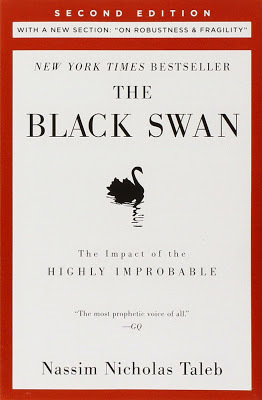
So I was moved to give Bookshelf Battle a long answer based on my own experience - an answer that was way too long for a comment thread - and as I was writing it, it occurred to me to share it here as a post: my hope is that it would be useful for anyone contemplating self-publishing their first novel. Learn from my mistakes!
So what I wrote is this:

Overall, in the course of the week, I sent out a total of 8 tweets regarding this post and I got 126 re-tweets with a potential outreach of 1,167.7k (yes, over one million!).
How many clicks? 98.
Looks good? Not really, if you analyze it further. The high number of re-tweets was caused by the hashtags I used and the very effective "power scheduling" used by Buffer (i.e. picking the best time of day to send them out given my own timezone and my "audience"). Now these hashtags are pertinent to the world of writers, things like #amwriting or #writetip or references to writers' associations like IAN or ASMSG. Hashtags, as we all know, ensure that tweets get re-tweeted.
But are the links to the post actually clicked? After all, that's what one wants: to get traffic to one's blog. But something strange actually happens: with a few exceptions, the clicks are lower than the re-tweets. I got 98 clicks for my 126 re-tweets. The shortfall was 28: that means 28 people re-tweeted without bothering to check the post and see whether it was worth sharing. They just clicked because of the hashtag. That's almost 25%...I worked the numbers out: to get one click, you need to reach out to at least 10,000 potential readers.
Then there is the "echo chamber" effect caused by the use of hashtags: people who re-tweet and click are (in this case) writers like myself. Now, as long as I'm clicking about an article like this one on a blog, people are likely to flock to it if they like the title and it sounds like something interesting to them (hey, titles for posts are important, remember to use keywords!). But if I'm clicking to draw people to my book page on Amazon, forget it. These people are writers, their Kindle is full to the brim, their TBR list is a mile long (I know, mine is!). We're all overstuffed with books! And when we want to relax, we go look at a TV series like Game of Thrones, right?
So this is the kind of environment in which a new writer must do battle. Small wonder it's hard to sell! You need all the help you can get of course. And that's where publishers can help newbies. They can get behind you and give a hand in all the phases of book production and promotion. That is...if they want to! Much depends on the kind of contract you eventually negotiate and then...It's a matter of luck. The Black Swan again...
But hope never dies, right? Besides, it's fun to write, isn't it? I wouldn't do anything else in the world. How about you?









There was one comment however that forced me to look back at my own experience, it came from someone calling himself (or herself?) "Bookshelf Battle", a great looking avatar:

And he (or she) concluded:
"I suppose the question boils down to 'Will you start with traditional publishing queries or just go directly to self publishing?' As a newbie, I'd love for a traditional publisher to take my hand and guide me through the process.On the other hand, I'm a nerd from Podunk, Nowhere and the likelihood of me jet-setting off to NYC or LA to charm the literary world into making my dream come true lies somewhere between slim and nil. For me and a lot of people like me, self-publishing may very well be the only path towards being a professional writer (with it fully understood that there's no guarantees in life, even in self publishing)."
Indeed, there's no guarantee! Publishing is risky, self-publishing is riskier. People like Konrath, David Gaughran etc are totally right in their guidebooks for newbies when they say that as a self-published author you are fully in control of every aspect of publishing - from editing and formatting to marketing - and that the returns are much, much higher (70%!) than in traditional publishing (you're lucky if you get 20%). But for that to happen, it still remains true that you need to get that return. A successful writer, whether traditionally published or going at it on his own, is always a "black swan", to use Talim Nasseb's famous metaphor: highly improbable.

So I was moved to give Bookshelf Battle a long answer based on my own experience - an answer that was way too long for a comment thread - and as I was writing it, it occurred to me to share it here as a post: my hope is that it would be useful for anyone contemplating self-publishing their first novel. Learn from my mistakes!
So what I wrote is this:
"I'm with you on this all the way, and it's exactly what I did! I started to query in 2009 and by 2011 I was desperate with rejections from literary agents! I'd done my "due diligence", the first two books of a trilogy were done (edited, formatted, good cover - I'd used BookBaby's services). Since the third was in progress and nearly finished, I figured I would publish all 3 within 3 months of each one, and I started with the first in May 2011. By December, all three were out. I had tweeted, facebooked etc, as well as announced and talked about on my blog (which I had started in 2009). In short, I had done all that one can reasonably expect to achieve success. I knew of course that success is elusive, it's a "black swan" and the chances of making it were slim! But it started very well. I had 30 sales in my first month, 47 in the second, reviews began pouring in, good reviews too, and so I figured, ok, I'm on my way! But by the third month, sales had petered out. I thought, no problem, I'll release the second book and do a promo on the first. And that's exactly what I did in September, and got over 2000 downloads. That looks like not much today, but back then, it was a respectable number. And in fact, my sales for both books again took off - though never exceeding (alas!) 50 per month.Indeed. Social media doesn't work the way it used to. I was reminded of this when I looked at my Twitter analytics for last week's post (I use Buffer, I highly recommend it, very useful). Here's the Buffer dashboard and the way they report on the results of one's tweets (screenshot of two tweets I sent out on 15 May):
Then the cycle repeated itself: the sales petered out, so I figured on doing another promo, which I did in January 2012, if my memory serves me right. With similar results - by that I mean a short spike in sales followed by a petering out...Very depressing, all the more so that the third book of the trilogy didn't take off. So I figured I'd release it in a single volume, an omnibus edition, in order to "force" readers to get to the third book (which I thought was in some ways the best and most fun) and also create an event to draw attention to my work. But I knew I needed to write another book and I did. Published it, same cycles were repeated. So I published yet another, and another. Always the same story, exhausting! So yes, I'm exhausted and turned off.
But it's been a fantastic experience. I've interacted with my readers, I've improved my writing - because I always read all my books' reviews, including the bad ones: if the criticism is constructive it can be enormously helpful. If it's not constructive, of course it should be simply ignored!
So now, after 5 years of doing it, I've come to the end of the road of self-publishing. Why? Not because I don't have more books up my sleeve - hum, wrong metaphor, shall we say writing hand? - but because the marketing cycles are getting less and less rewarding. In fact, I haven't sold a single copy in a whole year in spite of doing marketing campaigns (99 cent sales, giveaways, blog tours etc). Something happened in August 2014: KU started! And then I realized that Facebook and Twitter, for a writer like myself who's very present on Internet, had started to act like "echo chambers".

Overall, in the course of the week, I sent out a total of 8 tweets regarding this post and I got 126 re-tweets with a potential outreach of 1,167.7k (yes, over one million!).
How many clicks? 98.
Looks good? Not really, if you analyze it further. The high number of re-tweets was caused by the hashtags I used and the very effective "power scheduling" used by Buffer (i.e. picking the best time of day to send them out given my own timezone and my "audience"). Now these hashtags are pertinent to the world of writers, things like #amwriting or #writetip or references to writers' associations like IAN or ASMSG. Hashtags, as we all know, ensure that tweets get re-tweeted.
But are the links to the post actually clicked? After all, that's what one wants: to get traffic to one's blog. But something strange actually happens: with a few exceptions, the clicks are lower than the re-tweets. I got 98 clicks for my 126 re-tweets. The shortfall was 28: that means 28 people re-tweeted without bothering to check the post and see whether it was worth sharing. They just clicked because of the hashtag. That's almost 25%...I worked the numbers out: to get one click, you need to reach out to at least 10,000 potential readers.
Then there is the "echo chamber" effect caused by the use of hashtags: people who re-tweet and click are (in this case) writers like myself. Now, as long as I'm clicking about an article like this one on a blog, people are likely to flock to it if they like the title and it sounds like something interesting to them (hey, titles for posts are important, remember to use keywords!). But if I'm clicking to draw people to my book page on Amazon, forget it. These people are writers, their Kindle is full to the brim, their TBR list is a mile long (I know, mine is!). We're all overstuffed with books! And when we want to relax, we go look at a TV series like Game of Thrones, right?
So this is the kind of environment in which a new writer must do battle. Small wonder it's hard to sell! You need all the help you can get of course. And that's where publishers can help newbies. They can get behind you and give a hand in all the phases of book production and promotion. That is...if they want to! Much depends on the kind of contract you eventually negotiate and then...It's a matter of luck. The Black Swan again...
But hope never dies, right? Besides, it's fun to write, isn't it? I wouldn't do anything else in the world. How about you?









Published on May 20, 2015 01:31



